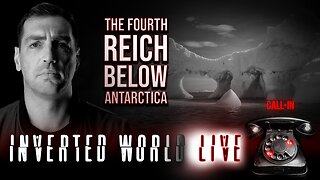Premium Only Content

Zachariah Sitchen - Friend or Fraud?
Cause Before Symptom - With Your Host James Carner
Zachariah Sitchen - Friend or Fraud?
I have seen many videos and books claiming Zachariah Sitchen was a fraud. I have also seen positive information stating he was on to something. Sitchen, a journalist and not a studied scholar, seemed to be self taught in Sumerian and Sanskrit writings. His interpretations have led to heated debates among both scholars and skeptics. He believed that we were created by extraterrestrial beings from another planetary system in our galaxy for the mining of gold. His hypothesis was that they used their DNA with a mix of chimpanzee DNA to form a dumbed down human hybrid worker that helped the aliens mine our natural resources. His studies have led to many books and movies including the famous film Stargate with Kurt Russell.
According to Zacharia’s book, the Annunaki and the Igigi secretely had love affairs with earth women which created demi-gods like, who left their names eternalized in the legends of many peoples. Some of the most famous were Gilgamesh, Hercules, Perseus and Samson forever known as Nephilim. This merging with humans caused the Annunaki great harm which led to men and the demigods creating vast cities and rebellion against their creators. Every 3600 years, the Annunaki’s planet called Niburu passes into our solar system causing a pole shift due to its immense density and gravitational pull. Cuasing earthquakes, volanic eruptions and tsunamis. The Annunaki’s final decision was to abaondon humans and return to their ships feeling back to space until the natural disasters subsided. Against his advisors family and government’s wishes, King Enki decided to save earth from the catacalism. He commissioned Utna Pishnam, a good natued man to create a giant ship called the preserver of life in preparation for a great flood that would wipe away all life on earth.
Sitchen most likely took information from the bible, the book of enoch and from his interpretations from sanskrit to form his own opinions. But was he wrong? Or partially correct? Let’s learn more about him.
According to Wikipedia:
Zecharia Sitchin (July 11, 1920 – October 9, 2010) was an author of a number of books proposing an explanation for human origins involving ancient astronauts. Sitchin attributed the creation of the ancient Sumerian culture to the Anunnaki, which he stated was a race of extraterrestrials from a planet beyond Neptune called Nibiru. He asserted that Sumerian mythology suggests that this hypothetical planet of Nibiru is in an elongated, 3,600-year-long elliptical orbit around the Sun. Sitchin's books have sold millions of copies worldwide and have been translated into more than 25 languages.
Sitchin's ideas have been resoundingly rejected by scientists, academics, historians (including Sumerologists, Orientalists and Assyriologists) and anthropologists who dismiss his work as pseudoscience and pseudohistory. His work has been criticized for flawed methodology, ignoring archaeological and historical evidence, and mistranslations of ancient texts as well as for incorrect astronomical and scientific claims.
Sitchin was born to a Jewish family in Baku, the capital of then Soviet Azerbaijan, and raised in Mandatory Palestine (which in 1948 became the modern state of Israel). According to an interview in the New York Times he received a degree in economics from the University of London, and was an editor and journalist in Israel before moving to New York in 1952. While working as an executive for a shipping company, he taught himself Sumerian cuneiform and visited several archaeological sites.
Similar to earlier authors such as Immanuel Velikovsky and Erich von Däniken, Sitchin advocated hypotheses in which extraterrestrial events supposedly played a significant role in ancient human history.
According to Sitchin's interpretation of Mesopotamian iconography and symbolism, outlined in his 1976 book The 12th Planet and its sequels, there is an undiscovered planet beyond Neptune that follows a long, southern tilted elliptical orbit (he also indicated that part of its orbit is to the north of Earth's equator), reaching the inner Solar System roughly every 3,600 years. This planet is called Nibiru (although Jupiter was the planet associated with the god Marduk in Babylonian cosmology). According to Sitchin, Nibiru (whose name was replaced with MARDUK in original legends by the Babylonian ruler of the same name in an attempt to co-opt the creation for himself) collided catastrophically with Tiamat (a goddess in the Babylonian creation myth the Enûma Eliš), which he considers to be another planet once located between Mars and Jupiter. This collision supposedly formed the planet Earth, the asteroid belt, and the comets. Sitchin states that when struck by one of planet Nibiru's moons, Tiamat split in two, and then on a second pass Nibiru itself struck the broken fragments and one half of Tiamat became the asteroid belt. The second half, struck again by one of Nibiru's moons, was pushed into a new orbit and became today's planet Earth. Sitchin also speculated that Pluto (which he identifies as both Gaga and Isimud) was originally a satellite of Saturn but Nibiru's gravity perturbed it, sending it to the outer Solar System and giving the body its peculiar orbital path, intersecting the orbit of Neptune.
According to Sitchin, Nibiru (called "the twelfth planet" because, Sitchin claimed, the Sumerians' gods-given conception of the Solar System counted all eight planets, plus Pluto, the Sun and the Moon) was the home of a technologically advanced human-like extraterrestrial race called the Anunnaki in Sumerian myth, who Sitchin states are called the Nephilim in Genesis. He wrote that they evolved after Nibiru entered the inner Solar System, and they first arrived on Earth probably 450,000 years ago, looking for minerals, especially gold, which they found and mined in Africa. Sitchin states that these "gods" were the rank-and-file workers of the colonial expedition to Earth from planet Nibiru.
According to Sitchin, Enki (the Sumerian god of water and human culture) suggested that to relieve the Anunnaki, who had mutinied over their dissatisfaction with their working conditions, that primitive workers (Homo sapiens) be created by genetic engineering as slaves to replace them in the gold mines by crossing extraterrestrial genes with those of Homo erectus. According to Sitchin, ancient inscriptions report that the human civilization in Sumer, Mesopotamia, was set up under the guidance of these "gods", and human kingship was inaugurated to provide intermediaries between mankind and the Anunnaki (creating the "divine right of kings" doctrine). Sitchin believes that fallout from nuclear weapons, used during a war between factions of the extraterrestrials, is the "evil wind" described in the Lament for Ur that destroyed Ur around 2000 BCE. Sitchin states the exact year is 2024 BCE. Sitchin says that his research coincides with many biblical texts, and that biblical texts come originally from Sumerian writings.
Since the release of his first book The 12th Planet in 1976, Sitchin has written seven other books as part of his Earth Chronicles series, as well as six other companion books. Sitchin's books have sold millions of copies worldwide and have been published in more than 25 languages. New York Times reporter Corey Kilgannon has noted that despite academic dismissal of his work, Sitchin has "a devoted following of readers".
Critic Michael S. Heiser has called Sitchin "arguably the most important proponent of the ancient astronaut hypothesis over the last several decades". Sitchin was a frequent guest on the Coast to Coast AM radio show, which in 2010 presented Sitchin with a lifetime achievement award. Gods of the New Millennium author Alan F. Alford admits he initially became "infatuated" with Sitchin's hypotheses but later became a critic of Sitchin's interpretations of myth.
According to some writers, Sitchin's ideas, along with those of Erich von Däniken, may have influenced the beliefs of the religious sect of Raëlism, and writer Mark Pilkington sees the mythology of Japan's Pana Wave religious group as rooted in Sitchin's The 12th Planet and its sequels.
The 1994 movie Stargate, directed by Roland Emmerich, and the 2009 video game The Conduit drew some conceptual inspiration from Sitchin's ideas, while screenwriter Roberto Orci says the villains of the film Cowboys & Aliens were inspired by Sitchin's conceptualization of the Anunnaki as gold-mining aliens.
In 2000, Lorin Morgan-Richards' theatrical performance of ENKI, based on the writings of Zecharia Sitchin, premiered in Cleveland, Ohio under the choreography of Michael Medcalf.
In 2016, Kazem Finjan, the Iraqi Minister of Transport, claimed at a press conference that Sumerians had built and used an airport in the Dhi Qar Governorate to launch spaceships 5000 years ago. He cited the work of Sitchin and others to support his assertion.
Criticism of Sitchin's work falls primarily into three categories: translations and interpretations of ancient texts, astronomical and scientific observations, and literalism of myth.
Translations and interpretations
When Sitchin wrote his books, only specialists could read the Sumerian language. However, sources such as the 2006 book Sumerian Lexicon have made the language more accessible to non-experts.
American biblical scholar Michael S. Heiser states he has found many inaccuracies in Sitchin's translations and challenges interested parties to use this book to check their validity. Prof. Ronald H. Fritze, author of the book Invented Knowledge: False History, Fake Science and Pseudo-religions, mentions the example of Sitchin's claim that the Sumerian sign DIĜIR means "pure ones of the blazing rockets", adding that "Sitchin's assignment of meanings to ancient words is tendentious and frequently strained." Fritze also commented on Sitchin's methodology, writing that "When critics have checked Sitchin's references, they have found that he frequently quotes out of context or truncates his quotes in a way that distorts evidence in order to prove his contentions. Evidence is presented selectively and contradictory evidence is ignored."
Sitchin bases his arguments on his personal interpretations of Egyptian and Sumerian texts, and the seal VA 243. Sitchin wrote that these ancient civilizations knew of a twelfth planet, when in fact they only knew five. Hundreds of Sumerian astronomical seals and calendars have been decoded and recorded, and the total count of planets on each seal has been five. Seal VA 243 has 12 dots that Sitchin identifies as planets. When translated, seal VA 243 reads "You're his Servant" which is now thought to be a message from a nobleman to a servant. According to Heiser, the so-called sun on Seal VA 243 is not the Sumerian symbol for the sun but is a star, and the dots are also stars. The symbol on seal VA 243 has no resemblance to the hundreds of documented Sumerian sun symbols.
In a 1979 review of The Twelfth Planet, Roger W. Wescott, Professor of Anthropology and Linguistics at Drew University, Madison, New Jersey, noted Sitchin's amateurishness with respect to the primacy of the Sumerian language:
Sitchin's linguistics seems at least as amateurish as his anthropology, biology, and astronomy. On p. 370, for example, he maintains that "all the ancient languages ... including early Chinese ... stemmed from one primeval source -- Sumerian". Sumerian, of course, is the virtual archetype of what linguistic taxonomists call a language-isolate, meaning a language that does not fall into any of the well-known language-families or exhibit clear cognation with any known language. Even if Sitchin is referring to written rather than to spoken language, it is unlikely that his contention can be persuasively defended, since Sumerian ideograms were preceded by the Azilian and Tartarian signaries of Europe as well as by a variety of script-like notational systems between the Nile and Indus rivers.
Astronomical and scientific observations
Sitchin's "planetary collision" hypothesis does superficially resemble one suggested by modern astronomers—the giant impact hypothesis of the Moon's formation about 4.5 billion years ago by a body impacting with the newly formed Earth. However, Sitchin's proposed series of rogue planetary collisions differ in both details and timing. As with Immanuel Velikovsky's earlier Worlds in Collision thesis, Sitchin states that he has found evidence of ancient human knowledge of rogue celestial motions in a variety of mythological accounts. In Velikovsky's case, these interplanetary collisions were supposed to have taken place within the span of human existence, whereas for Sitchin these occurred during the early stages of planetary formation, but entered the mythological account passed down via the alien race which purportedly evolved on Nibiru after these encounters.
According to former Immanuel Velikovsky assistant turned prolific critic, C. Leroy Ellenberger, "[Sitchin states that] from an equal start, the Nephilim evolved on Nibiru 45 million years ahead of comparable development on Earth with its decidedly more favorable environment. Such an outcome is unlikely, to say the least, since Nibiru would spend over 99% of its time beyond Pluto. Sitchin's explanation that heat from radioactive decay and a thick atmosphere keep Nibiru warm is absurd and does not address the problem of darkness in deep space. Also unexplained is how the Nephilim, who evolved long after Nibiru arrived, knew what happened when Nibiru first entered the solar system."
The scenario outlined by Sitchin, with Nibiru returning to the inner Solar System regularly every 3,600 years, … implies an orbit with a semi-major axis of 235 astronomical units, extending from the asteroid belt to twelve times farther beyond the sun than Pluto. Elementary perturbation theory indicates that, under the most favorable circumstances of avoiding close encounters with other planets, no body with such an eccentric orbit would keep the same period for two consecutive passages. Within twelve orbits the object would be either ejected or converted to a short period object. Thus, the failed search for a trans-Plutonian planet by T.C. Van Flandern, of the U.S. Naval Observatory, which Sitchin uses to bolster his thesis, is no support at all.
Sitchin in "the case of Adam's alien genes" states that 223 genes found by the Human Genome Sequencing Consortium are without the required predecessors on the genomic evolutionary tree. Later researchers have argued that the conclusion from the Human Genome Sequencing Consortium cannot be drawn due to a lack of a comprehensive gene database for comparison. An analysis by Salzberg identified 40 potential genes laterally transferred into the genome from prokaryotic organisms. Salzberg also argues that gene loss combined with sample size effects and evolutionary rate variation provide an alternative, more biologically plausible explanation.
Literalism of myth
Peter James, co-author of the controversial book Centuries of Darkness, has criticized Sitchin both for ignoring the world outside Mesopotamia and more specifically for wholly misunderstanding Sumerian, Assyrian and Babylonian literature:
He uses the Epic of Creation Enuma Elish as the foundation for his cosmogony, identifying the young god Marduk, who overthrows the older regime of gods and creates the Earth, as the unknown "Twelfth Planet". In order to do this he interprets the Assyrio-Babylonian theogony as a factual account of the birth of the other "eleven" planets. The Babylonian names for the planets are established beyond a shadow of a doubt—Ishtar was the deity of Venus, Nergal of Mars, and Marduk of Jupiter—and confirmed by hundreds of astronomical/astrological tables and treatises on clay tablets and papyri from the Hellenistic period. Sitchin merrily ignores all this and assigns unwarranted planetary identities to the gods mentioned in the theogony. For example, Apsu, attested as god of the primeval waters, becomes, of all things, the Sun! Ea, as it suits Sitchin, is sometimes planet Neptune and sometimes a spaceman. And the identity of Ishtar as the planet Venus, a central feature of Mesopotamian religion, is nowhere mentioned in the book—instead Sitchin arbitrarily assigns to Venus another deity from Enuma Elish, and reserves Ishtar for a role as a female astronaut.
William Irwin Thompson comments on what he calls Sitchin's 'literalism': What Sitchin sees is what he needs for his hypothesis. So figure 15 on page 40 is radiation therapy, and figure 71 on page 136 is a god inside a rocket-shaped chamber. If these are gods, why are they stuck with our cheap B movie technology of rockets, microphones, space-suits, and radiation therapy? If they are gods, then why can't they have some really divine technology such as intradimensional worm-hole travel, antigravity, starlight propulsion, or black hole bounce rematerializations? Sitchin has constructed what appears to be a convincing argument, but when he gets close to single images on ancient tablets, he falls back into the literalism of "Here is an image of the gods in rockets." Suddenly, ancient Sumer is made to look like the movie set for Destination Moon. Erich Von Däniken's potboiler Chariots of the Gods? has the same problem. Nazca plains in Peru is turned into a World War II landing strip. The gods can cross galactic distances, but by the time they get to Peru, their spaceships are imagined as World War II prop jobs that need an enormous landing strip. This literalization of the imagination doesn't make any sense, but every time it doesn't, you hear Sitchin say "There can be no doubt, but ..."
Skeptics say about Sitchin:
“Zecharia Sitchin (1920–2010) was an author known for his controversial theories regarding ancient Sumerian texts and the idea of ancient astronauts. He is best known for his series of books, particularly "The Earth Chronicles," where he proposed that extraterrestrial beings, which he called the Anunnaki, visited Earth in ancient times and influenced human civilization.
While Sitchin claimed to be a scholar of Sumerian culture and language, his interpretations and translations of ancient texts have been widely criticized by experts in the fields of archaeology, history, and linguistics. Many scholars consider his work to be pseudoscience, arguing that he misinterpreted Sumerian mythology and language to support his theories.
In summary, while Sitchin had a background in journalism and was not a trained Sumerian scholar, his contributions are often viewed as more of a fringe theory rather than credible scholarship.”
“I would say he is not only a fraud but is currently (July 17th, 2024) engaged in a continuous crime spree against just about anything and anyone. Anytime he recalls an incident of wrongdoing by himself or Israel in general (victims of Israel) he instantly says “Victims of God” and uses me as a mind-control patsy to apparently do something that has been done by Israel or others he is “defending.” I don’t use the word “God” to call anyone I know or myself, I don’t use Bible names to call people by in real life. I am 100% convinced that RELIGION IS MENTAL ILLNESS, THERE IS NO CORRECT INTERPETATION OF THE BIBLE AND NO “RIGHT WAY” TO DO CHURCH. The “Continuity of Crime” that is a 24-hour a day nightmare today is the doing of Zecharia Sitchin and the emotional/psychological condition of the human population is degraded and injured by it. He is engaged in a continuum of the behavior so the cessation of it will come WHEN SOMEONE CAN POSSIBLY UNDERSTAND A JEWISH PERSON TO BE GUILTY OF SOMETHING AND DO SOMETHING ABOUT IT.”
“Yes Zecharia Sitchin was a complete fraud,and nothing he has written is a correct understanding of the sumerian texts. For a conclusive refutation of his sumerian “translation”, see: Christian O'Brien v Zecharia Sitchin Comparing Historical Records
and: SitchinIsWrong”
“When Sitchin wrote his books, only specialists could read the Sumerian language. However, sources such as the 2006 book Sumerian Lexicon have made the language more accessible to non-experts.”
“American biblical scholar Michael S. Heiser states he has found many inaccuracies in Sitchin's translations and challenges interested parties to use this book to check their validity. Prof. Ronald H. Fritze, author of the book Invented Knowledge: False History, Fake Science and Pseudo-religions, mentions the example of Sitchin's claim that the Sumerian sign Din-Gir means "pure ones of the blazing rockets", adding that "Sitchin's assignment of meanings to ancient words is tendentious and frequently strained." Fritze also commented on Sitchin's methodology, writing that "When critics have checked Sitchin's references, they have found that he frequently quotes out of context or truncates his quotes in a way that distorts evidence in order to prove his contentions. Evidence is presented selectively and contradictory evidence is ignored."
“Sitchin bases his arguments on his personal interpretations of pre-Nubian and Sumerian texts, and the seal VA 243 which is shown here. Sitchin wrote that these ancient civilizations knew of a twelfth planet, when in fact they only knew five. Hundreds of Sumerian astronomical seals and calendars have been decoded and recorded, and the total count of planets on each seal has been five. Seal VA 243 has 12 dots that Sitchin identifies as planets. When translated, seal VA 243 reads "You're his Servant" which is now thought to be a message from a nobleman to a servant. According to Heiser, the so-called sun on Seal VA 243 is not the Sumerian symbol for the sun but is a star, and the dots are also stars. The symbol on seal VA 243 has no resemblance to the hundreds of documented Sumerian sun symbols.”
In a 1979 review of The Twelfth Planet, Roger W. Wescott, Professor of Anthropology and Linguistics at Drew University, Madison, New Jersey, noted Sitchin's amateurishness with respect to the primacy of the Sumerian language:
“Sitchin's linguistics seems at least as amateurish as his anthropology, biology, and astronomy. On p. 370, for example, he maintains that "all the ancient languages ... including early Chinese ... stemmed from one primeval source -- Sumerian". Sumerian, of course, is the virtual archetype of what linguistic taxonomists call a language-isolate, meaning a language that does not fall into any of the well-known language-families or exhibit clear cognation with any known language. Even if Sitchin is referring to written rather than to spoken language, it is unlikely that his contention can be persuasively defended, since Sumerian ideograms were preceded by the Azilian and Tartarian signaries of Europe as well as by a variety of script-like notational systems between the Nile and Indus rivers.”
“Unfortunately there are many such pseudo-scientists in the world making bold claims about pre-astronautics, conspiracy theories, or unsubstantiated claims about certain languages being the “mother of all languages” or “the oldest language in the world” or “the language of the gods”. For some weird reason, it’s always the same languages that are often claimed to be alien, super-old, the first language of mankind, etc.: Sumerian, Etruscan, Tamil, Sanskrit, Greek, Serbian, Albanian. There is usual little to no scientific facts behind such claims.”
According to his fans:
“Sitchin spent his life researching all his books. He could read all the ancient languages, from Hebrew to Akkadian, from Aramaic to Sumerian. He went on his own explorations to all the sites mentioned by Enki (that which are still available such as the Great Pyramid and Baalbek) and to every museum in the WORLD and read every tablet, artifact and every cuneiform writing he could get his hands on. He wrote other scholars or spoke with them on the phone or in person. He fact-checked everything and offered up his evidence for the reader's dissemination.”
On his website, he says he’s “One of the few scholars able to read and interpret ancient Sumerian and Akkadian clay tablets, Zecharia Sitchin (1920-2010) based his bestselling The 12th Planet on texts from the ancient civilizations of the Near East. Drawing both widespread interest and criticism, his controversial theories on the Anunnaki origins of humanity have been translated into more than 20 languages and featured on radio and television programs around the world.”
Scholar he was not. He was an ameteur turned expert without the help of academia. Sitchin found translation books and did it himself. If the government was really involved in his work to use him as a conditioning teacher, they would have propped him up with more credentials. Intead, he has more critics than admirers.
Is there a Nibiru?
Followers and readers of Zecharia Sitchin will know that the information about Nibiru comes from the Sumerians and the writing and artifacts they, and other ancient people, left behind. The core premise he has made in his writings is that there is a 10th Planet (again, including Pluto) in our solar system with an elliptical orbit of about 3600 of our years. People from Nibiru came to Earth and discovered the gold they needed to help repair their atmosphere and they began mining it. Much of the knowledge of these ancient people, which they knew because the Anunnaki (those who from heaven to Earth came) told them, has come true, including the color and size of Neptune and Uranus, and the very existence of the outer planets, long before our telescopes could find them. Scientists even suspect another large object in the Kuiper Belt, which might be Nibiru. So let's assume that the other writings also have merit.
According to Zecharia Sitchin, and discussed at length in his book, The End of Days, Nibiru is not due to come near Earth for at least several hundred more years from now. Although it is possible that celestial events have impacted Nibiru's orbit and shortened its annual cycle from 3600 years to something less, we don't need to worry about its presence near Earth for some time.
When it comes, will it cause calamity? During its existence, it has orbited the sun and come into the vicinity of Earth thousands of times. A few of those caused calamities on Earth. Zecharia believed that the Biblical Deluge was caused by the gravitational pull of Nibiru causing the Antarctic ice cap to slip into the ocean and create a world-wide tsunami that inundated the Earth. In pre-history, Nibiru, or its moons, may have collided with Earth, exchanging genetic material that allowed life on both planets to evolve with compatible DNA. Most of the time, when Nibiru came into the vicinity of the solar system near the sun and the other known planets, there were no incidents of concern.
Readers of Zecharia Sitchin's work will be inclined to believe there is a Nibiru and that the ancient Sumerians were writing from the knowledge of the Anunnaki about the planet, its orbit, its inhabitants, especially those who came to Earth, and of the origins of life on our planet Earth. They will say, as Zecharia did, that there is no doubt that there is a Nibiru. While we agree that there is no need for panic, we otherwise respectfully disagree with Morrison on this subject.
Regarding the January 19, 2016 publication of an article in The Astronomical Journal about evidence for another large planet in our solar system in the Kuiper Belt beyond Pluto, Zacharia wrote on January 20: With an elliptical orbit of 10,000 or 20,000 of our years, this planet may not be Nibiru, which has an orbit of about 3600 of our years. However, this prediction of a likely additional planet in our solar system is exciting news. Perhaps the search will lead us to either finding Nibiru, or perhaps we'll find that something has changed and impacted Nibiru's orbit since the last time it orbited Earth. I have my doubts, but since I'm not an astronomer, I'll keep an open mind. I don't think this is Nibiru.
Hollywood and mainstream news have been hinting at planet X or Nibiru for quite some time. Movies like 2012 with John Cusak shows what happens when there is a pole shift. The government has been studying a body in space just as the Vatican has. The vatican reportsw they are using lucifer for Physics and planetary sciences: observatory scientists study a range of related sciences such as quantum gravity; meteorites and Moon rocks; and possible life on planets orbiting other stars. However, Tom Horn in his book Petrus Romanus, they interviewed scientists at the Mount Graham Observatory who told them they were watching a planet that is behind the sun. The CIA’s declassified book The Adam & Eve Story by Chan Thomas talks about a calamity just like the flood but every 6500 years and not 3600 years. We know of whistleblowers that have talked about a pole shift coming and this is why bunkers are being built.
No doubt that our history shows civilazation gets wiped out every now and then. We have found spark plugs in 2 million year old coal mines and all sorts of technology that existed millions of supposed years ago. I do believe Zacharia put together everything he believed to be accurate based on his bias and belief system. This means he may not be a fraud altogether, but someone who put forth a theory of his own and garnered some attention for it. Academia doesn’t like him because he says “aliens”. Religion doesn’t like him because he says Enki was God. Archeologists don’t like him because he wasn’t a doctor or had a PHD. Only a degree economics. Theologins don’t like him because he wasn’t trained in reading sanskrit or Sumerian. Is being self taught such a bad thing?
i believe Sitchin believed in his theories and was not forced or bribed to release his work. Many have said he is a paid informant for the government to pitch the idea of aliens but I do not think this is a valid argument. There isn’t anything batantly tied to him and the government as far as I could tell. He knew the bible well enough to find out if there was a connection to ancient Egypt and other past dynasties to explain away the nephilim and fallen angels as physcial bodies and not spirit. Perhaps he is as interested in the sons of god seed as I am. Where the question is, how can a spirit impregnate a body? And how do we explain the giants and their wisdom, knowledge and strength? He paints a logical picture removing the element of Jehova or God and replacing it with extra terrestrial entities. I believe the government left him alone because his narrative fits theirs. If I never were to have spiritual encounters myself, I would tend to lean on Zacharia and his theories. Especailly if I was not introduced to Christianity at a young age. His theories make a more plausible explanation on the origins of man and in the future, when Christianity finally runs thin, his work will be more appreciated. I believe he was partially correct. Since we live in a bubble aurrounded by water, there is no such thing as extraterrestrials, space and anything beyond a golden firmament. Zacharia believed in space the universe, which academia believes is real, too. Unfortnately, he died before congress finally admitted to inter-dimensional beings which Zacharia would have to go back to the drawing board to explain it this way.
Sources
Gemini AI
https://www.tiktok.com/t/ZTFRooWWC/
https://www.quora.com/Is-Zecharia-Sitchin-a-Sumerian-scholar-or-a-fraud
https://www.cia.gov/readingroom/docs/CIA-RDP79B00752A000300070001-8.pdf
-
 LIVE
LIVE
TimcastIRL
2 hours agoTrump WAR On Deep State BEGINS, FBI Launches CRIMINAL Probe Against Comey & Brennan | Timcast IRL
27,801 watching -
 LIVE
LIVE
Inverted World Live
3 hours agoThe Fourth Reich Below Antarctica | Ep. 71
380 watching -
 LIVE
LIVE
Barry Cunningham
3 hours agoPRESIDENT TRUMP IS EXECUTING ON A WHOLE DIFFERENT LEVEL! HE ALWAYS HAS!
8,294 watching -
 1:34:00
1:34:00
Nick Freitas
3 hours agoCan Elon Musk’s America Party Actually Win?
11.9K9 -
 31:35
31:35
Solar Groove Muzic
22 hours ago $0.03 earnedDeep House Mix 2025 | Deep House, Vocal House, Nu Disco, Chillout
106 -
 1:21:31
1:21:31
Glenn Greenwald
4 hours agoTrump Mocks Concerns About Epstein; Trump Continues Biden's Policy of Arming Ukraine; Trump and Lula Exchange Barbs Over Brazil | SYSTEM UPDATE #483
101K90 -
 54:26
54:26
Edge of Wonder
7 hours agoTexas Floods: Boots on the Ground with Shawn Livingston
13.2K8 -
 1:38:45
1:38:45
LIVE WITH CHRIS'WORLD
2 hours agoLIVE WITH CHRIS'WORLD - DO YOU FEEL LIED TO?
15.5K5 -
 1:06:31
1:06:31
BonginoReport
5 hours agoIs Trump Trying To Sweep Epstein Under The Rug? - Nightly Scroll w/ Hayley Caronia (Ep.85)
142K183 -
 1:19:40
1:19:40
Kim Iversen
6 hours agoDid Cloud Seeding Cause The Texas Floods?
114K91